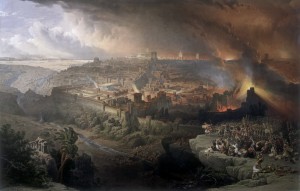 God is not a harsh, vengeful judge, waiting to punish us for our sins. He is “ready to pardon, gracious and merciful, slow to anger, and of great kindness” (Nehemiah 9:17). He says, “I have no pleasure in the death of the wicked; but that the wicked turn from his way and live: turn ye, turn ye from your evil ways; for why will ye die?” (Ezekiel 33:11). His thoughts toward us are “thoughts of peace, and not of evil, to give you an expected end” (Jeremiah 29:11).
God is not a harsh, vengeful judge, waiting to punish us for our sins. He is “ready to pardon, gracious and merciful, slow to anger, and of great kindness” (Nehemiah 9:17). He says, “I have no pleasure in the death of the wicked; but that the wicked turn from his way and live: turn ye, turn ye from your evil ways; for why will ye die?” (Ezekiel 33:11). His thoughts toward us are “thoughts of peace, and not of evil, to give you an expected end” (Jeremiah 29:11).
It is true that the Scriptures speak of the wrath of God. But God’s anger is not like ours. It is grief. For when Jesus would have healed the man with the shriveled hand on the Sabbath and was accused of being a Sabbath-breaker, He “looked round about on them with anger, being grieved for the hardness of their hearts” (Mark 3:5). When the vials of God’s wrath are poured out, and the seven last plagues will afflict this world, the temple in heaven will be “filled with smoke from the glory of God, and from his power” and no man is able to enter it until the plagues have ceased (Revelation 15:8). This scene is reminiscent of the dedication of the Temple of Solomon when “the priests could not stand to minister by reason of the cloud: for the glory of the Lord had filled the house of God” (2 Chronicles 5:14).
Moses asked God to show him this same glory, and the Lord hid him in the cleft of the rock and passed by him and proclaimed the name of the Lord. “The Lord, the Lord God, merciful and gracious, longsuffering, and abundant in goodness and truth, keeping mercy for thousands, forgiving iniquity and transgression and sin and that will by no means clear the guilty; visiting the iniquity of the fathers upon the children, and upon the children’s children, unto the third and to the fourth generation” (Exodus 34:6-7). His name is His glory, for it is His character.
When the temple in heaven is filled with smoke during the time of the plagues, it will be a time when the deep things of the character of God are revealed to mankind. In the judgments, the pain of God’s heart is revealed for “He doth not afflict willingly” (Lamentations 3:33). Remember the words of Jesus as He gazed upon the beautiful city of Jerusalem from the crest of Mount Olivet: “O Jerusalem, Jerusalem, thou that killest the prophets, and stonest them which are sent unto thee, how often would I have gathered thy children together, even as a hen gathereth her chickens under her wings, and ye would not!” (Matthew 23:37).
There is a revealing Scripture in Psalms 9:16:
“The Lord is known by the judgment which He executeth: the wicked is snared in the work of his own hands.”
“Be not deceived; God is not mocked: for whatsoever a man soweth, that shall he also reap (Galatians 6:7). The wicked “made a pit, and digged it, and is fallen into the ditch which he made. His mischief shall return upon his own head, and his violent dealing shall come down upon his own pate (Psalms 7:15-16). God simply steps back and lets those who reject His mercy reap the consequences of their actions.
In The Great Controversy, Ellen G. White writes this clarifying statement:
“God does not stand toward the sinner as an executioner of the sentence against transgression; but He leaves the rejectors of His mercy to themselves, to reap that which they have sown. Every ray of light rejected, every warning despised or unheeded, every passion indulged, every transgression of the law of God, is a seed sown which yields its unfailing harvest. The Spirit of God, persistently resisted, is at last withdrawn from the sinner, and then there is left no power to control the evil passions of the soul, and no protection from the malice and enmity of Satan.” (The Great Controversy, page 36.)
But this is painful to Him, for it is a life that has been purchased by the infinite sacrifice of His only begotten Son. He loves them with an “everlasting love” (Jeremiah 31:3). Therefore, the temple of God is filled with smoke that the terrible and painful grief of our loving, heavenly Father may be hidden.
“For the Lord shall rise up as in mount Perazim, he shall be wroth as in the valley of Gibeon, that He may do his work, his strange work; and bring to pass his act, His strange act” (Isaiah 28:21).
“To our merciful God the act of punishment is a strange act… While He does not delight in vengeance, He will execute judgment upon the transgressors of His law. He is forced to do this to preserve the inhabitants of the earth from utter depravity and ruin. In order to save some, He must cut off those who have become hardened in sin.” (Patriarchs & Prophets, page 628.)
God takes no pleasure in executing judgment. But He is, in a sense, pushed into a corner and He must do what needs to be done. In most instances, God will step back and let nature take its course – the individuals will reap the consequences of their own decisions. Satan will have full control over them to do with them as he pleases, and he is the one who does take delight in the death of the wicked. Sadly, because they have constantly resisted God’s loving watch-care, He can no longer protect them from the malice of Satan. Remember the snakes that attacked the Israelites in the wilderness? The snakes had always been there, but God protected the people from them. When they rejected Him, He withdrew His protection, and the snakes ran wild through the camp. We have no idea how much God is protecting us every day. We cannot afford to be without it for any moment.
But there also comes a time when God must Himself step in to execute judgment. And this is a great source of perplexity for many, for God has said, “Thou shalt not kill.” Is God a hypocrite? The angel of God flew over Egypt, slaying all the firstborn; His angel executed judgment on Israel for David’s sins; and the angel of the Lord smote 185,000 Assyrians as they came up to fight against King Hezekiah. It is judgments such as these where God seems to contradict His own commandments, and leave many in perplexity as to His true character. But let us examine a small number of quotations from the book, Patriarchs and Prophets and see if we can find an answer to this apparent problem.
When the Israelites danced around the golden calf, God commanded the execution of those who were most guilty of the crime of idolatry, and had not a repentant spirit. For what reason? Ellen White clarifies some things for us:
“Though God had granted the prayer of Moses in sparing Israel from destruction, their apostasy was to be signally punished. The lawlessness and insubordination into which Aaron had permitted them to fall, if not speedily crushed, would run riot in wickedness, and would involve the nation in irretrievable ruin. By terrible severity the evil must be put away.” (Patriarchs & Prophets, page 323.)
If God had not punished these sin-hardened idolaters, the entire nation would have been corrupted by them. Then, by rejecting God and His ways, they would have removed themselves from His protection and abandoned themselves to the full control of Satan. In such a condition many would have perished in the wilderness from thirst and hunger while the remaining survivors would have been killed or enslaved by their enemies.
But not only would this sin have brought ruin upon the Israelites, but it would have hardened the surrounding nations in their own iniquities.
“It was necessary that this sin should be punished, as a testimony to surrounding nations of God’s displeasure against idolatry. By executing justice upon the guilty, Moses, as God’s instrument, must leave on record a solemn and public protest against their crime. As the Israelites should hereafter condemn the idolatry of the neighboring tribes, their enemies would throw back upon them the charge that the people who claimed Jehovah as their God had made a calf and worshiped it in Horeb. Then though compelled to acknowledge the disgraceful truth, Israel could point to the terrible fate of the transgressors, as evidence that their sin had not been sanctioned or excused.
“Love no less than justice demanded that for this sin judgment should be inflicted. God is the guardian as well as the sovereign of His people. He cuts off those who are determined upon rebellion, that they may not lead others to ruin.” (Ibid, page 325.)
Here we see that God understands the power of example. “None of us liveth to himself” (Romans 14:7). “As in water face answereth to face, so the heart of man to man” (Proverbs 27:19). Not only justice demanded the destruction of the idolaters, but also love. Love for the rest of the nation. Love for those who were not yet hardened in sin and had not yet closed their hearts to the promptings of the Spirit of God. God is merciful to those who are ignorantly sinning, for “the times of this ignorance God winked at” (Acts 17:30). Before the individual becomes too hardened in sin through ignorance, God wants to awaken their cosncience that they might understand the danger in which they are in. By executing judgment upon those who had already hardened their hearts, he was giving the rest of the nation an opportunity to see the wickedness of their actions, that they might make an intelligent choice in their own lives.
Yet, God saw an even bigger picture. As the omniscient “I AM”, He saw the effects of this rebellion not just upon the Israelites, or the surrounding nations, but upon the whole world.
“In sparing the life of Cain, God had demonstrated to the universe what would be the result of permitting sin to go unpunished. The influence exerted upon his descendants by his life and teaching led to the state of corruption that demanded the destruction of the whole world by a flood. The history of the antediluvians testifies that long life is not a blessing to the sinner; God’s great forbearance did not repress their wickedness. The longer men lived, the more corrupt they became.
“So with the apostasy at Sinai. Unless punishment had been speedily visited upon transgression, the same results would again have been seen. The earth would have become as corrupt as in the days of Noah. Had these transgressors been spared, evils would have followed, greater than resulted from sparing the life of Cain.” (Patriarchs & Prophets, page 325.)
Is this not a very clarifying statement? Unless God had speedily visited the transgression at Sinai, the entire world would have become corrupted as in the days of Noah. After the great and terrible judgments visited upon Egypt, the whole world was looking to see who this God was that had delivered the nation of Israel from their bondage. If He had not punished the Israelites for their idolatry, the entire world would have been emboldened in their sins and ceased to tremble before a God of judgment.
“It was the mercy of God that thousands should suffer, to prevent the necessity of visiting judgments upon millions. In order to save the many, He must punish the few. Furthermore, as the people had cast off their allegiance to God, they had forfeited the divine protection, and, deprived of their defense, the whole nation was exposed to the power of their enemies. Had not the evil been promptly put away, they would soon have fallen a prey to their numerous and powerful foes. It was necessary for the good of Israel, and also as a lesson to all succeeding generations, that crime should be promptly punished. And it was no less a mercy to the sinners themselves that they should be cut short in their evil course. Had their life been spared, the same spirit that led them to rebel against God would have been manifested in hatred and strife among themselves, and they would eventually have destroyed one another. It was in love to the world, in love to Israel, and even to the transgressors, that crime was punished with swift and terrible severity.” (Patriarchs & Prophets, page 325.)
This is one of the least understood attributes of the character of God. We often forget that He sees all the future outcomes that will result from the choices we make. He understands the consequences far better than we do. And where He sees it is necessary, He will intervene in judgment to prevent an individual who has already made their decision against God and His ways from stealing from another individual the opportunity to make an intelligent decision. This judgment will be executed by God permitting them to meet the consequences of their actions. Very rarely will He intervene and execute judgment by His own hand.
“Since thou wast precious in my sight, thou hast been honourable, and I have loved thee: therefore will I give men for thee, and people for thy life” (Isaiah 43:4).
God loves all men and women with a love as equal and enduring as eternity. But what can He do when individuals reject His love, and the eternal life that comes with receiving it? His heart is crying, “How can I give thee up?” (Desire of Ages, page 645). Those who reject such a love often continue on in a miserable and bitter existence, poisoning the lives of those around them with their own influence, and often infecting them with the same negativity. God hears the heart’s cry of those who long for something better than this world has to offer and are reaching out to Him, although they may not yet know it is Him whom they are reaching out to. God will do whatever is necessary that these persons might have a chance to receive Him. If the situation is such that they are in a foul bondage to the rejectors of His grace, God will intervene and “give men for thee, and people for thy life.” He will permit those whose probationary time has closed to die so that others might be free from their influence to make their own decision.
God will give all men an opportunity to either choose Him, or reject Him. Sometimes there are loved ones who have been taken suddenly and mysteriously from us, and we worry for their future life. But we must trust that God’s Spirit has been striving with them, although we did not know it, and they have been making their own decisions. Sometimes God will even take someone at the very moment when their heart is surrendered to Him, that they might not fall a prey to Satan and his devices in the future. Whatever it is that happens, we must trust that God is judge, and that He will judge the soul and reward it with all equity.
God has no pleasure in death. It is Satan who delights in that. But there are times when God has to do something that He does not want to do, and this is why it is called a “strange act” – because He considers it strange Himself. Because He loves us so much, He will do something that He doesn’t want to do. He will deny even His own self, and will take life, so that we might have a better opportunity for eternal life. But the life that He takes has already made its decision. He is simply taking back that which was His, and that had been rejected. In the case of children who have not yet reached the age of accountability, we may never understand God’s reasons for permitting them to be taken from us. But we must trust that He permitted it for a good reason, and if we want to be sure that we will see them again, we must be more faithful in choosing Him and His ways.
One thing that we must never forget, is all that we have is “now”. Yesterday is gone, tomorrow may never come. What I have today is the culmination of everything that came before, but shall I spend the day in sorrow and regret for the consequences that I meet today, or for the missed opportunities or shall I put my hand in God’s and deal with the situation as it is? Remember that “all things work together for good to them that love God, to them who are the called according to His purpose” (Romans 8:28). Just make sure that you believe and receive His love, then He will work for your salvation in ways that will be beyond your comprehension, and one day you will understand the purpose in everything. God is love. There is no doubt about that.
NOTE: This article dies not profess to answer all the questions about the judgments of God. There are some things that we will never understand until we are in heaven.





